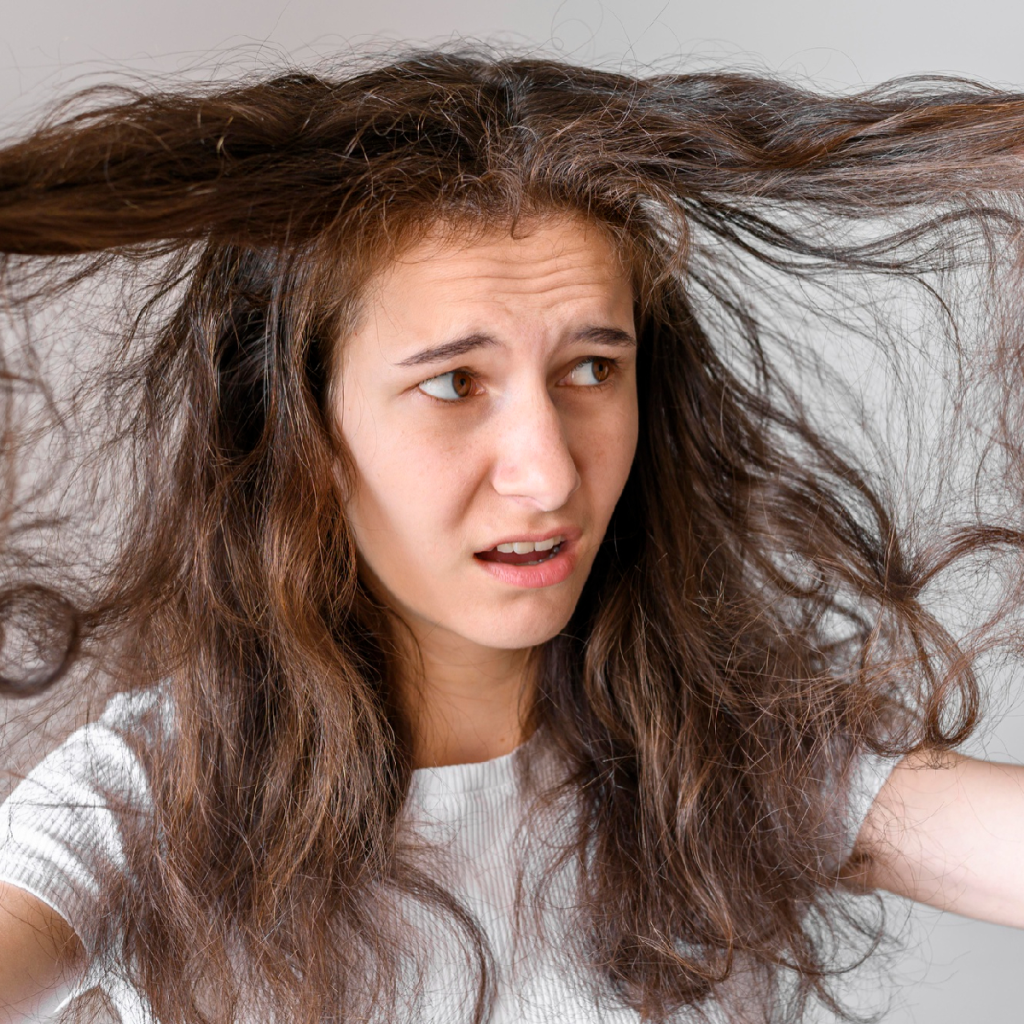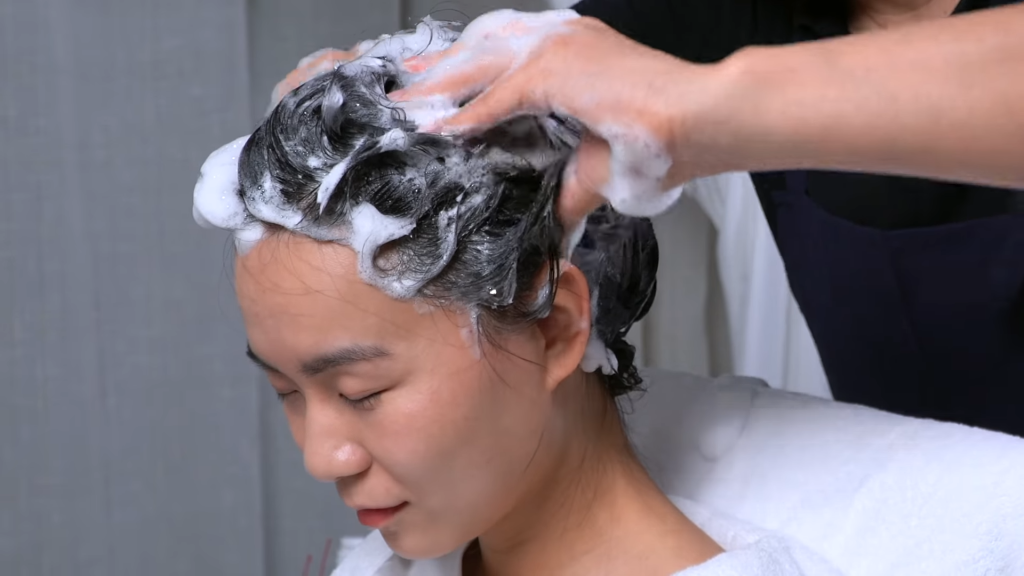Discover the causes behind frizzy hair and explore effective solutions to tame those unruly locks.
What Causes Hair to Become Frizzy? – Causes and Solutions
Have you ever woken up with a head full of frizz and wondered why your hair has decided to rebel against you? Fear not, frizzy-haired friends! We’re here to uncover the root causes of frizz and share some solutions to tame those wild strands. So grab your favorite detangling brush and let’s dive into the world of frizzy hair!

Understanding Hair Structure
Before we can tackle the frizz, let’s get to know our hair a little better. Each strand of hair has a fascinating structure that plays a crucial role in how it behaves. One key player in the frizz game is the hair cuticle, a protective layer that wraps itself around the hair shaft. Think of it as the bodyguard of your hair, keeping it safe from external aggressors like pollution and heat.
But what happens when this bodyguard fails to do its job properly? That’s when frizz comes knocking on your follicles’ door. When the hair cuticle is raised or damaged, moisture can enter the hair shaft, causing it to swell and frizz up like a balloon at a birthday party gone wrong.
The Role of the Hair Cuticle
The hair cuticle acts as the gatekeeper of moisture, ensuring that just the right amount enters and exits your hair. It’s like Goldilocks and the Three Bears – too much moisture and you’re left with a frizz explosion, too little moisture and your hair becomes dry and brittle. So, maintaining a balanced cuticle is key to keeping the frizz at bay.
Imagine your hair cuticle as a microscopic fortress, with tiny overlapping scales forming a protective barrier. These scales are like the shingles on a roof, overlapping and tightly packed to keep everything in check. When your hair cuticle is healthy and intact, it lays flat, creating a smooth surface that reflects light and gives your hair a healthy shine.
However, various factors can cause the hair cuticle to become raised or damaged. Harsh chemical treatments, excessive heat styling, and even environmental factors like UV rays can all take a toll on your hair’s protective layer. When the cuticle is compromised, it loses its ability to retain moisture effectively, leading to frizz and dryness.
How Hair Holds Moisture
Now, let’s talk about how hair holds on to moisture. Healthy hair contains natural oils that act as a protective coating. These oils help to retain moisture, keeping your locks smooth and frizz-free. However, certain factors can disrupt this delicate balance, leading to frizz that would make even Einstein’s hair jealous.
One factor that can disrupt the moisture balance in your hair is excessive washing. While it’s important to keep your hair clean, over-washing can strip away the natural oils that keep your hair hydrated. This can leave your hair feeling dry, brittle, and prone to frizz.
Another factor to consider is the environment you expose your hair to. Dry climates, for example, can suck the moisture out of your hair, leaving it parched and frizzy. On the other hand, high humidity can cause your hair to absorb excess moisture from the air, resulting in a frizz-fest.
Furthermore, the type and texture of your hair also play a role in how it holds moisture. Curly hair, for instance, tends to be drier because the natural oils produced by the scalp have a harder time traveling down the hair shaft. This makes curly hair more prone to frizz and requires extra care and hydration.
In conclusion, understanding the structure of your hair and how it holds moisture is essential in the battle against frizz. By maintaining a healthy hair cuticle and providing your hair with the right balance of moisture, you can keep those frizzy days at bay and embrace smooth, luscious locks.
Common Causes of Frizzy Hair
Frizz can be a sneaky little devil, appearing out of nowhere and ruining your perfectly styled hair in a matter of minutes. Here are some common culprits behind frizz:
Humidity and Weather Changes
Humidity – the arch-nemesis of frizz-fighters everywhere. When the air is heavy with moisture, it can penetrate your hair shafts, causing them to swell and go into full-on frizz mode. So, if you’re planning a tropical vacation or live in a humid climate, be prepared to battle the frizz with all your might.
Imagine strolling along a picturesque beach, the sun shining down on you, and a gentle breeze caressing your face. Sounds idyllic, right? But as you enjoy the beauty of nature, your hair starts to rebel against the humidity. The once sleek and smooth strands transform into a wild tangle of frizz. It’s a battle between you and the elements, as you desperately try to tame your unruly mane.
Humidity doesn’t discriminate – it can turn even the most well-behaved hair into a frizz fest. The moisture in the air seeps into your hair, disrupting its delicate balance and causing it to expand. Suddenly, your carefully styled locks resemble a lion’s mane, defying gravity and refusing to be tamed.
Heat Styling Tools
Oh, the allure of heat styling tools! While they can work wonders for transforming our hair into sleek and stylish masterpieces, they can also be the cause of our frizzy woes. Excessive heat damages the hair cuticle, leaving it vulnerable to frizz. So, remember to use heat protectant sprays and give your locks a break from the hot tools every now and then.
Picture this: you’re getting ready for a night out, and you want your hair to look flawless. You reach for your trusty flat iron, set it to the highest temperature, and start straightening away. As the heat makes contact with your hair, the sizzling sound fills the room. Little do you know, with each pass of the iron, you’re stripping your hair of its natural moisture, leaving it parched and prone to frizz.
Heat styling tools can be a double-edged sword. While they can give you that sleek and polished look, they can also lead to frizz if not used properly. It’s important to find a balance between styling and protecting your hair. Consider using lower heat settings, investing in quality tools, and always applying a heat protectant spray before subjecting your hair to the scorching heat.
Chemical Hair Treatments
We all love a little hair makeover now and then, but chemical treatments can wreak havoc on your hair’s health. Color treatments, perms, and relaxers can weaken the hair cuticle, making it prone to frizz. If you must indulge in these treatments, make sure to give your hair some extra TLC to keep the frizz at a safe distance.
Imagine walking into a chic salon, ready to transform your look with a trendy new hair color. The stylist works their magic, applying the color with precision and care. You leave the salon feeling like a whole new person, with vibrant locks that turn heads wherever you go. But as the days go by, you start noticing that your once-luscious hair is becoming frizzy and unmanageable.
Chemical hair treatments can be a game-changer in terms of style, but they can also be a nightmare for frizz-prone individuals. The chemicals used in these treatments can weaken the hair’s structure, making it more susceptible to frizz. It’s crucial to provide your hair with extra nourishment and protection after undergoing any chemical treatment. Deep conditioning treatments, hair masks, and leave-in conditioners can help restore moisture and keep frizz at bay.
Lack of Proper Hydration
No, we’re not talking about drinking water here (although that’s essential too!). Keeping your hair hydrated is crucial in the fight against frizz. Dry hair tends to soak up moisture from the air, leading to unruly frizz. So, be sure to give your hair the hydration it cries out for with a nourishing conditioner or hair mask.
Imagine a desert oasis, with palm trees swaying in the breeze and a crystal-clear pool inviting you to take a dip. As you relax by the water’s edge, you notice that your hair feels dry and brittle, craving some much-needed moisture. Little do you know, the lack of hydration in your hair is a recipe for frizz.
Proper hydration is the key to maintaining smooth and manageable hair. When your hair lacks moisture, it becomes thirsty for any moisture it can find – including the moisture in the air. As a result, your hair absorbs the humidity, causing the dreaded frizz to take over. To combat this, incorporate hydrating products into your hair care routine. Look for conditioners and hair masks that are specifically formulated to nourish and moisturize dry, frizz-prone hair.
The Genetic Factor in Frizzy Hair
When it comes to frizz, sometimes we can’t blame external factors alone. Genetics play a significant role in determining our hair type and its propensity for frizziness.
Hair Type and Frizziness
Curly hair, oh how we envy your bounce and definition! But with curls often come the dreaded frizz. Curly hair is naturally more prone to frizz due to its structure. The twists and turns of the hair shaft create more surface area for the outside world to wreak havoc on our precious locks.
Ethnicity and Hair Frizz
Different ethnicities have different hair structures, leading to varying levels of frizz. Those with Afro-textured hair often face more challenges in managing frizz due to the hair’s unique characteristics. However, with the right care and products, anyone can rock their natural frizz with pride.
How to Prevent Frizzy Hair
Now that we’ve uncovered the secrets of the frizz universe, it’s time to arm you with some solutions to keep your hair sleek and smooth.

Choosing the Right Hair Products
When it comes to fighting frizz, not all hair products are created equal. Look for products specifically designed to tackle frizz, like smoothing shampoos, conditioners, and serums. These heroes will coat your hair with a protective shield, keeping moisture at bay and frizz under control.
Proper Hair Washing Techniques
Believe it or not, the way you wash your hair can make a world of difference in controlling frizz. Opt for a gentle shampoo that won’t strip your hair of its natural oils. Avoid harsh towel-drying – instead, gently squeeze out excess water and let your hair air dry or use a diffuser. Embrace the natural air-dried look, and you may be pleasantly surprised by its frizz-taming powers!
The Importance of Regular Trims
Split ends are the frenemies of frizz-free hair. Regular trims will keep those split ends at bay, preventing them from traveling up the hair shaft and causing more frizz. Plus, who doesn’t love the feeling of freshly trimmed ends brushing against their shoulders?
So, dear frizz-fighters, armed with this newfound knowledge, you can now face the frizz head-on. Remember, a little frizz never hurt anyone – it’s what makes our hair unique and full of personality. But if you’re looking for some sleek and shiny locks, give these tips a try and bid farewell to frizz once and for all!





